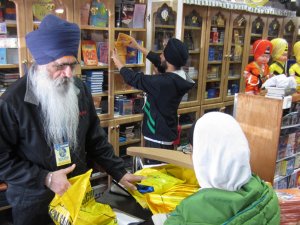At The Cross-Roads: Life in a Cul-de-Sac
by I.J. Singh
The human is an intellectual creature but not entirely; a heavy dose of emotional glue joins the intellect. The mix transcends what either intellect or emotion can never do alone. The magic happens when our head and heart jointly parse the inner self. Then we learn how to come to terms with Gurbani. - I.J. SINGH
History tells us that Sikhs started coming to the United States around 1901when the Panama Canal was built. I came here when there were perhaps only 3 Sikhs in New York, and even fewer in Oregon where I attended graduate school. There was not much of a Sikh community in the 3000 miles between the East and West coasts. Now more than 20 gurduaras flourish in commuting distance of where I live in New York. And we are at a critical point in history.
It is not surprising that wherever new migrants established new community centers their primary goal was to recreate and recapture the sights, sounds and smells of home in Punjab or where else we came from. That’s also why our institutions in the diaspora look and function the way they do.
We are now in a different reality and a different culture. Our goal of an equal place at the table of this society demands newer skills at bridge-building between diverse people. We also need to value our traditions. Such habits of the heart connect us to a rich, tried and true way of life.
Quite expectedly, conflicts surface between our traditional ways and our progressive endeavors. Old ways and new realities often clash. Reform is never easy. These difficulties, too, are welcome, mystifying and inevitable at the same time.
The past has brought us to a point but we live in the present, not in the past. The Guru Granth (p. 660) reminds us “
ਹਮ ਆਦਮੀ ਹਾਂ ਇਕ ਦਮੀ ਮੁਹਲਤਿ ਮੁਹਤੁ ਨ ਜਾਣਾ ॥
Hum aadmi haen ik damee(N).
We are human beings of the briefest moment; we do not know the appointed time of our departure. (Ang 660)
That one breath is the present – short and precious. The past creates our roots. Is it any wonder that the past defines and shapes us? How to deal with it? Hope springs eternal but often dies young. Ergo, the past never abandons us. Nor should we be in a hurry to abandon it.
Similar thoughts often rudely jolt us. We want to never let go of the past and yet the lure of newer tastes beguiles us. We value the cocoon that nurtured and comforted us for ages, yet we hungrily grab at the new world that tempts us every day.
My simple mind, sickened by the battles between the old and the new, settles on a simple analogy — that of our gurduaras. The gurdwara structure resists the modern world and yet the new world keeps knocking at its gate, noisily, often rudely.
No matter how wisely or strongly we drag gurduara-language and protocol into a new reality and vocabulary, the change feels threatening, even traumatic mixture of the old and new, and the mind resists.
I prefer to see our community life as both the old and the new while minimizing the inevitable conflict between the two. With such blinders, I see Sikh social existence as two realities: One as the department of Internal Affairs, that is best seen as Sikh life in a gurduara, while the other would be External Affairs. Different temperament and skills underlie each reality. Yet the two coexist simultaneously. Collectively they speak of what we really are.
True that these two need additional institutions that fund the programs, or defend them when necessary. Other units to our identity arise such that the whole remains greater than the sum of the parts. The two remain linked, but often at war, rarely heading towards a common purpose. In that lie our problems!
I dare say that the traditional role of the community remains the most resistant to change. Here I mean the traditions of Katha, Keertan Langar and related protocols. There is magic to timeless memories and habits. These are the Internal Affairs of a community. Let them flower!
Think a moment. When we enter the gurduara, critical thinking is left outside, along with several centuries that could be excellent material for an intellectual engagement with superfine ideas. Remember the lines from the Guru Granth that pointedly asks us to parse the ideas and add them to life rather than just bow to the book:
ਡਿਠੈ ਮੁਕਤਿ ਨ ਹੋਵਈ ਜਿਚਰੁ ਸਬਦਿ ਨ ਕਰੇ ਵੀਚਾਰੁ ॥
Dithae mukt na hoveyee jitctchar sabd na karay vitchaar
One is not liberated by merely seeing Him, unless one contemplates the Word of His Shabad (Ang 594).
And there is the rub. The human is an intellectual creature but not entirely; a heavy dose of emotional glue joins the intellect. The mix transcends what either intellect or emotion can never do alone.
The magic happens when our head and heart jointly parse the inner self. Then we learn how to come to terms with Gurbani. To analyze its message the best site is the congregation devoted to this common goal that I term the Department of Internal Affairs. For this endeavor a gurduara-like setting is best. But sometimes the issues are different or overlapping and may talk to us of the world outside our social construct. We need to take note of others who follow different paths. They need to know us just as we need to know our neighbors. Hopefully, we will work through our differences along principles that are respectful and tolerant of our common ground in the wider world – the External Affairs.
I strongly feel that External Affairs should maintain communication and contact with the Gurduara based Internal Affairs, but External Affairs should be based outside the gurduara premises.
I remind you that Sikhi teaches a wholistic model of life that has two wings: Peeri and Meeri. If Meeri is the worldly life of material concerns and successes, Peeri represents the underlying values of spirituality and morality. Without both horses working apace in sync with each other, the journey will remain unfinished and unsatisfactory, no matter how luxurious the carriage. The trouble lies in our community centers – gurduaras — where we speak of peeri, but not so much of meeri. I suppose outside of gurduaras the tide is turned and peeri finds short shrift.
Life appears as in a blind alley – a cul-de-sac –a small narrow pathway with a minuscule opening? Trying to make changes in it is challenging. That’s how I see our age-old habits and our blinders when trying to change direction within a gurduara. A cul-de-sac offers comfort and safety but little that is new or challenging to growth.
As the world around us changes will we not see it reflected in our lives? A cul-de-sac of the mind is a constricted space. The majestic coach of a people needs both Internal Affairs as well as External Affairs. Or else the ride will continue to be rocky.





